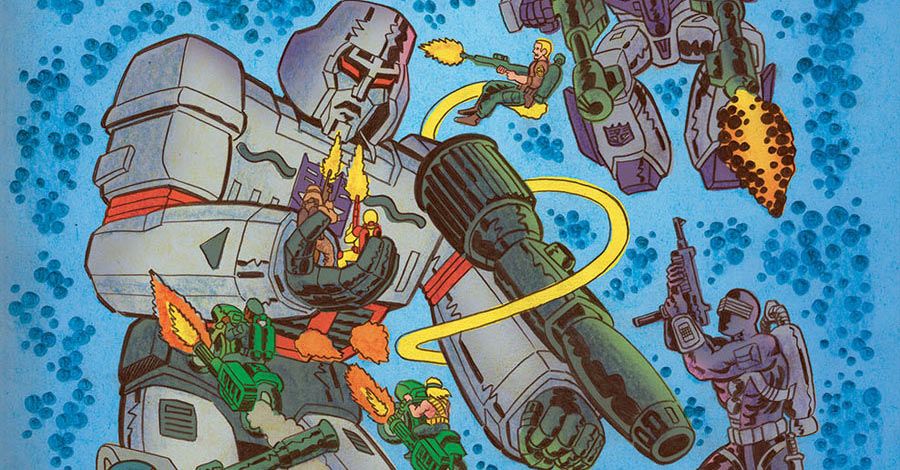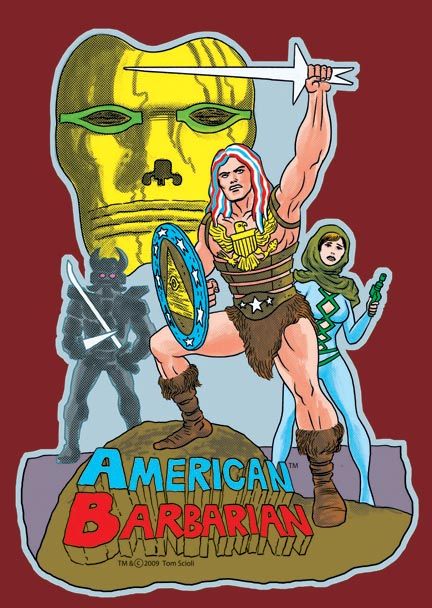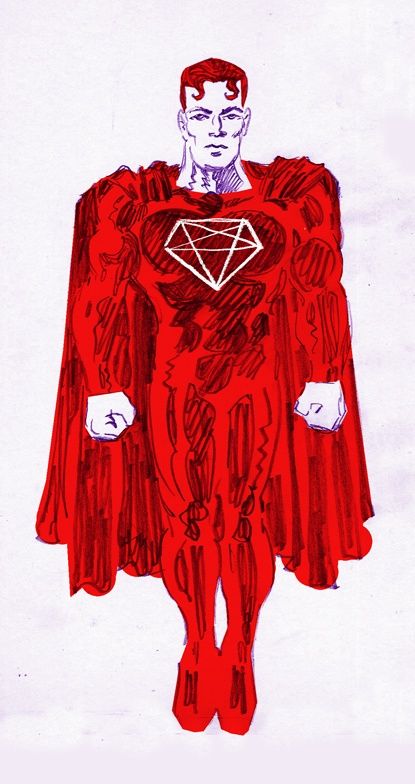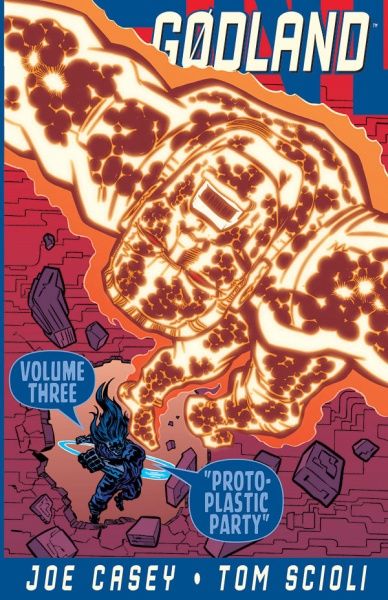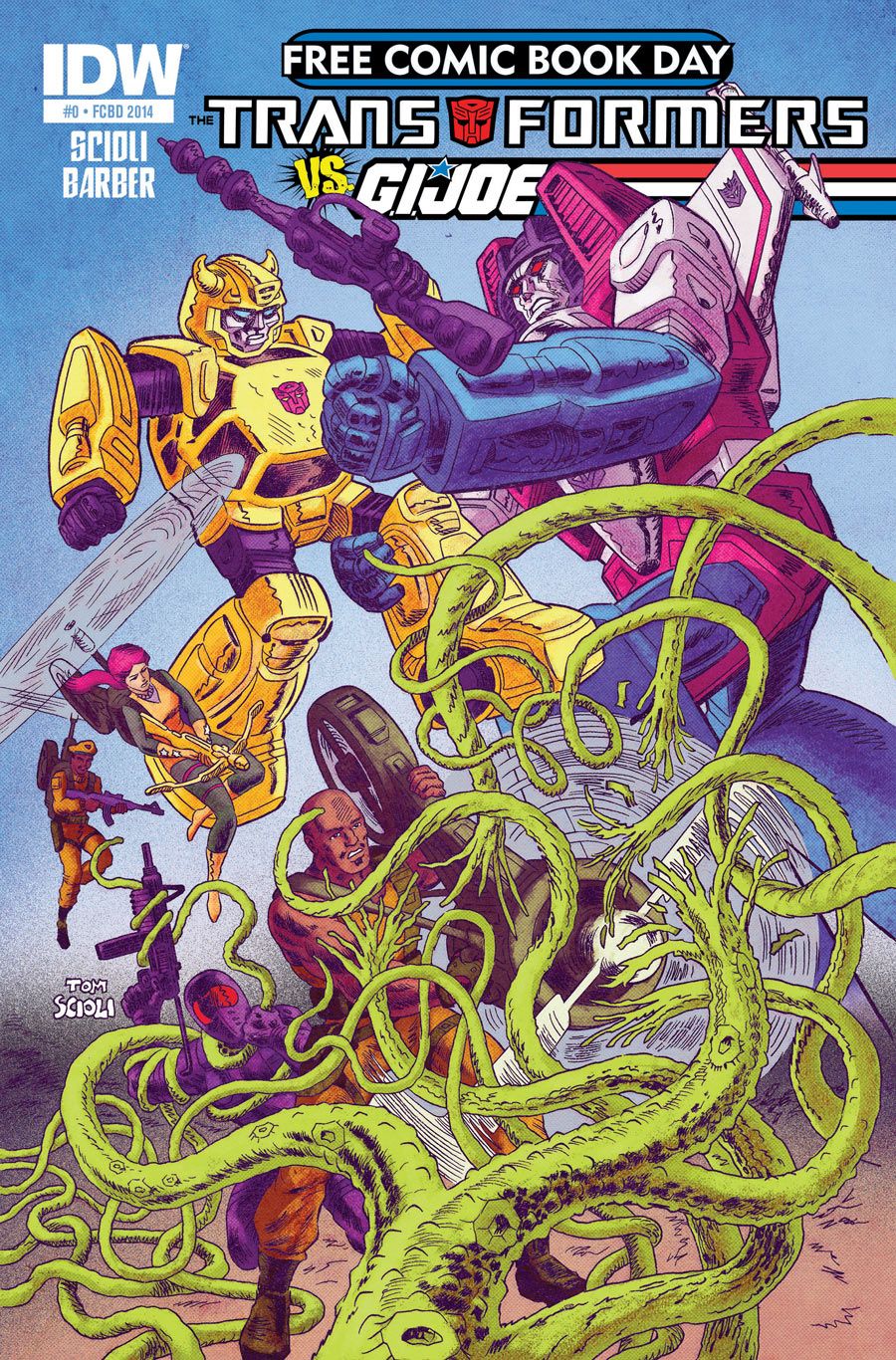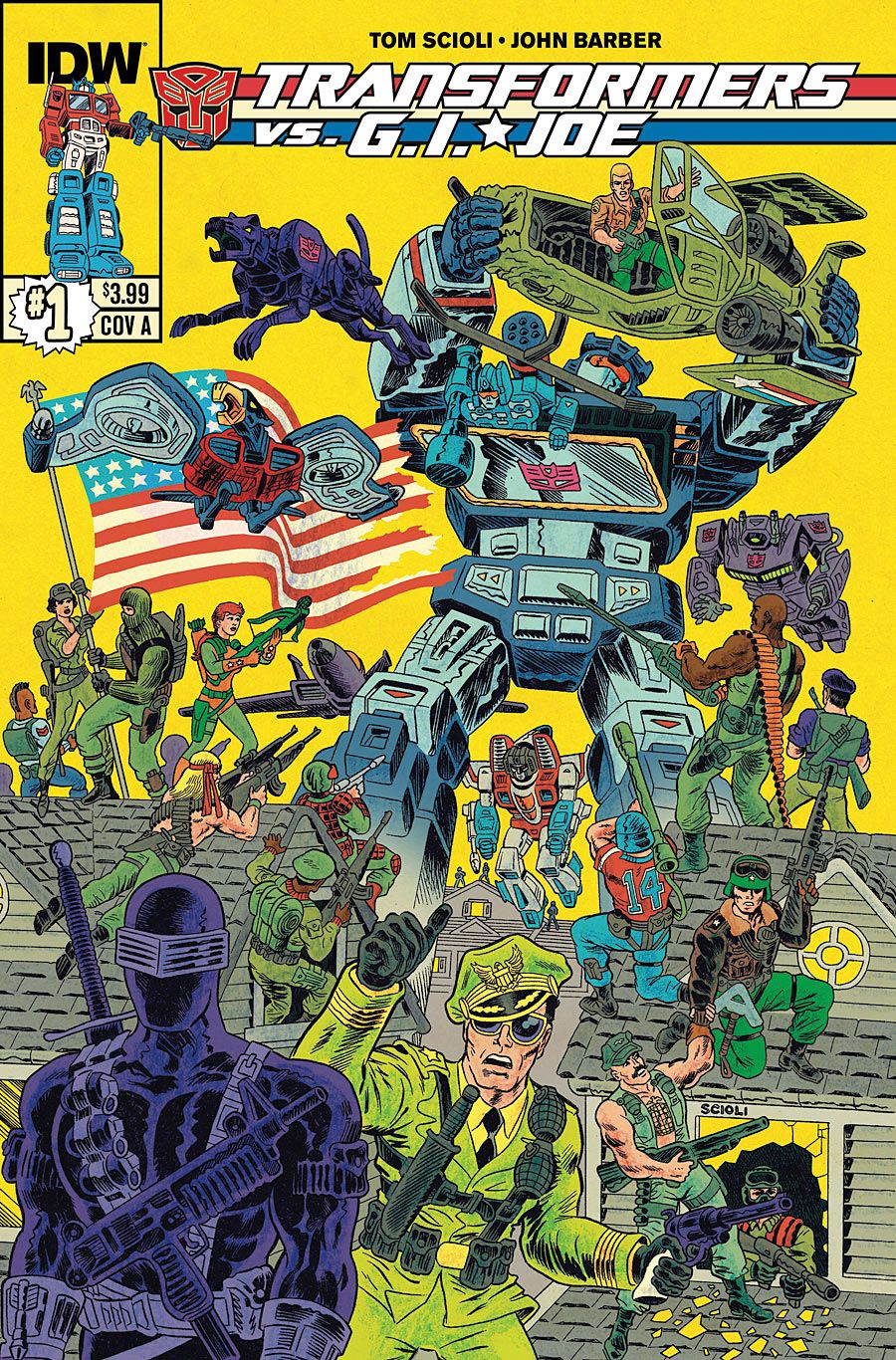Odds are, at some point in 2014, you've seen Tom Scioli's name. He's the guy who, since this year's Free Comic Book Day, has gotten a pretty significant amount attention for his uniquely stylistic take on the Transformers and G.I. Joe. These are more than just two of IDW Publishing's biggest licensed properties, but are two of the biggest, most visible and well-established brands in the world, and Scioli has been given free rein to do with them as he pleases.
"This has definitely been a very big year for me," Scioli said. "It's been exciting and I really am in a good place right now."
How could he not be? "Transformers vs. G.I. Joe" is proving to be one of the big buzz books of the summer, and Scioli has gained a level of awareness among comic book fans and professionals that had eluded him for over a decade.
Not bad for a guy who, just one year ago, quit comics.
"I was frustrated," he said. "I had been doing comics for so long but it felt like there was only so much progress I was able to make."
Scioli had been working in comics for over a decade and his biggest series to date, Image Comics' "Godland," was coming to a close. Co-created with writer Joe Casey, "Godland" revisited the cosmic super hero story, an epic not unlike the genre-stretching work of Jack Kirby or Jim Starlin. "Godland" wasn't Scioli's first work, but it had gotten him and his art style quite a bit of attention.
He had hoped to parlay into even bigger things in his next creator-owned project: "American Barbarian." Where "Godland" had been a return to the golden age of cosmic comic storytelling, "American Barbarian" drew more from the likes of "Thundarr the Barbarian" and "Kamandi, the Last Boy." Scioli had high hopes.
"I thought it was better than what I'd done in 'Godland," Scioli said. "I sent it out and no one wanted it."
He opted to publish "American Barbarian" online at AmBarb.com and, once the story was finished, AdHouse Books released a collected edition. "American Barbarian" didn't find the audience he had hoped for, but Scioli wasn't ready to walk away just yet. He instead poured everything he had into his next project: "Satan's Soldier."
In "Satan's Soldier," Scioli decided to push his art style to new places while telling the story of a hyper-violent, indifferent Superman-esque character. Like "American Barbarian" before it, Scioli looked at the work as being the best of his career.
"It broke a lot of ground and I was really pushing myself," he said. "And then I got the rejection letters. At that point, I thought, maybe there was some secret ingredient I was missing. I thought I had created three really good things, and two of them, nobody wanted anything to do with."
He had hit a brick wall. Scioli loved comics and he loved making them. Yet, at least as it seemed to him at that time, no one wanted him anywhere near the medium.
So last summer, Tom Scioli quit.
"I took a lot of things very personally," he said. "I thought, 'Do I want to be in a business like this? Where you're back to square one with the start of every single new project?' It just seemed disheartening. It seemed like in every other business you could build on past successes, but not this one. Obviously, these were just my perceptions at the time."
When Scioli quit comics, he quit completely. Before, he didn't really have anything resembling free time. With every spare moment, he was sketching, drawing, and plotting stories. Spending time away from comics wasn't really a thing for him. Comics was his life.
"Immediately after I quit, I had jury duty," he said. "Ordinarily, I'd bring a sketchbook with me, but that time, I brought nothing and it felt good. For the first time, I had non-structured, non-productive time where I could just sit there and be a person and think."
The story of Tom Scioli's comic book career could have ended right there. After all, creating comics was never his day job. He could have easily joined the ranks of people who tried making a go of working in the field but ultimately found more lucrative work elsewhere.
But within one week, he was back to creating comic books.
"I realized that I hadn't really made a rational decision," Scioli said. "I realized I had not exhausted every option there was available to me. I realized there were a lot of publishers I didn't reach out to, that I'd only submitted to publishers who had open submission policies. I realized it was time to treat comics like my full-time job."
For the entire duration of Scioli's career in comics, he'd always maintained a day job, doing freelance 3D modeling work. During his week away, he realized that he'd been playing it safe, and never fully committed himself to making comics an actual career.
"So I quit my day job," he said. "It was time to take a chance on me. I did the math, and I knew I could make a living if I was willing to increase the number of conventions I did and not say 'no' to anything. The math bore out that I could do it. I didn't know how much of a living I could make, but I knew I could make one. So I got up one Monday morning and absolutely had no choice but to make a living in comics."
He became focused in a way he'd never allowed himself to be. One of the first things he did was to reach out to IDW via their letters' page. Senior Editor John Barber saw Scioli's name and, being a fan of the artist, immediately assigned him a "Black Dynamite" cover. But soliciting publishers was only part of Scioli's equation. If he wanted to get serious about comics and grow a fanbase that would support him and his work, he would have to open himself up to the public. Yet letting fans take a peak behind the curtain was outside of his comfort zone. Luckily, he had some friends there to give him a push.
"A lot of people I respected were saying the same thing," he said. "That I had to put myself out there."
Chief among them were fellow Pittsburgh-based creators Jim Rugg and Ed Piskor. Rugg, creator of "Street Angel" and host of the podcast "Tell Me Something I Don't Know," learned of Scioli quitting comics from the Internet just like everyone else. Rugg, Scioli and Piskor often travel the convention circuit together and Scioli had never mentioned any intent to leave the field. Rugg said at first he thought something terrible had happened, or that there had been a fight with an unnamed publisher. Instead, he heard a story of gradual frustration. While encouraging Scioli to give comics one more try, he also urged Scioli to up his online presence.
"I'm a huge advocate for participating with community," Rugg said. "There's a human element to it and there's a promotional aspect as well. For some artists, there's a stigma attached to that and I don't understand it. It's nice to interact with the community in a way you can't at a convention. There's opportunity in talking about the things you're passionate about."
Scioli had to work to overcome his reluctance to share personal details.
"In the past, I tried to stick to only talking about my work and nothing about me," Scioli said. "I would only talk about my work and keep my personality out of it. I don't think that was doing me any favors."
Scioli began an overhaul of his public persona. On his personal site, AmBarb.com, he began writing about his creative processes, sharing works-in-progress and explaining creative decisions. He also began getting professional work writing essays about comics for different blogs and news sites. Writing about comics didn't just boost his profile, though.
"It helped my process," he said. "A lot of things I talked about were sort of creative challenges I wondered about. Writing about those helped me to clarify certain techniques."
As Scioli was rededicating himself to his craft, Barber had been wanting to do an ongoing Transformers/G.I. Joe series. There was just one minor problem: The series appeared impossible.
"Our take on G.I. Joe isn't really set in a world where Cybertronians walk around," Barber said. "Oh, you could do it, but it wouldn't be right in the set-up we had. So the idea was that we would have to somehow mash those together."
He said a lot of ideas were batted around, but nothing really took hold. At least, not until he read an issue of Image's "East of West" by Jonathan Hickman and Nick Dragotta.
"I was reading that one night and I started thinking about the work Dragotta had done on Marvel's 'FF,'" Barber said. "I was thinking about how he'd Kirby-ed his work up a little bit. And then I was hit with this flood of ideas. 'What if we did that with Transformers/G.I. Joe? What if we got Tom Scioli to do Transformers/G.I. Joe? Wouldn't that be interesting? Wouldn't that be crazy?' My mind was rushing with big ideas. I emailed Tom the next day."
Barber knew he wanted Scioli. What he didn't know was that Scioli had almost left comics just a few weeks prior to his email.
"I had no idea he'd quit comics," Barber said. "I just found that out a few weeks ago. All I knew was I was a fan of his work and that he was the guy I wanted on this book."
He heard back from Scioli immediately.
"I jumped on it," Scioli said. "But at the same time, I knew it wasn't a done deal. I knew Hasbro still had to approve everything and I was apprehensive. I've been involved in situations that was something big was going to happen only to be scuttled at the last minute."
Still, that didn't keep Scioli from starting work before any deal was finalized.
"This was my big chance," he said. "To do it right, I had to think about constructing this big, rigorous story where all the parts fit together and to do that I couldn't wait until deals came through. That would have left me with a month to get everything done and a month wasn't enough for the grand, overarching things I wanted to do."
Hasbro approved the book and Barber was attached to co-write "Transformers vs. G.I. Joe" alongside Scioli. The duo began working together despite having never met face-to-face and, as their partnership took shape, Barber understood Scioli's versatility.
"There are rules when writing comics," Barber said. "Things like 'Don't have a character doing multiple things in one panel.' Tom can break those rules. I had to throw all the rules out the window. I'm at a point now where if I write a panel that seems possible to draw, then I feel like I'm not doing something right."
When the decision was made to publish a "Transformers vs. G.I. Joe" comic for Free Comic Book Day 2014, Barber and Scioli opted to craft something special rather than just giving bits of issue #1. Barber wanted the 0 issue to be a completely original prologue, and Scioli obliged.
"I needed to make a statement with this book," Scioli said.
Readers -- and retailers -- responded. IDW reports the issue was their highest-ordered Free Comic Book Day offering ever.
"All of a sudden, I was having hundreds of thousands of people who'd never heard of me suddenly being exposed to my work and it was the best 16 pages of comics I'd ever done," Scioli said.
And that's just the start. Scioli said he's got big plans for the book, plans that will last for years and take the characters to places he hopes they've never been before. To him, the book's central conceit is as creatively fertile as they come.
"We're talking giant robots from space versus man," he said. "This has the scale of something Kirby would have done. I plan on making this job last as long as I can because I like it and I see tremendous potential for it. I'm treating it like I'm Jack Kirby, Steve Ditko or Stan Lee and building a universe that stands the test of time."
And as for that week-long retirement?
"I think everyone needs a break sometimes," he said. "But I'm in a better place now. I know now I could find the next thing should this project go away. There would be an audience for my work and there would be publishers wanting to publish it. I'm in a good place right now and that's not dependent on the success of any particular project."
"Transformers vs. G.I. Joe" #1 is scheduled for release on July 23.
UPDATE 7/18/14 9:15 AM PT: An earlier version of this article inaccurately stated the "American Barbarian" collected edition was self-published.

